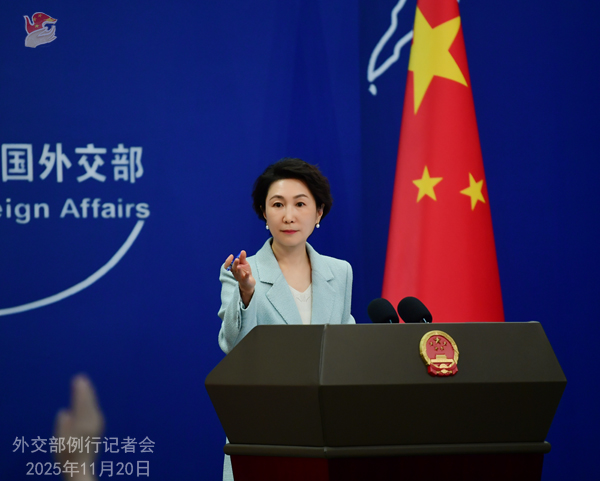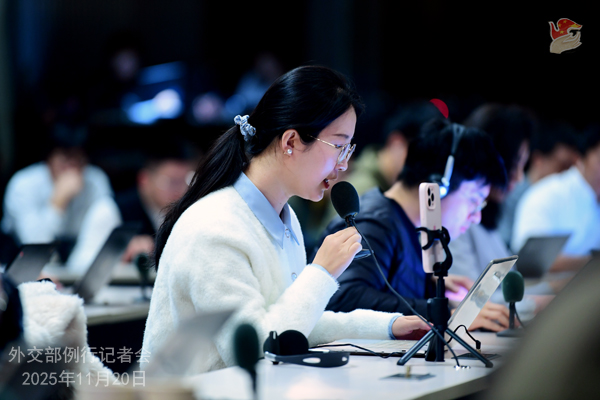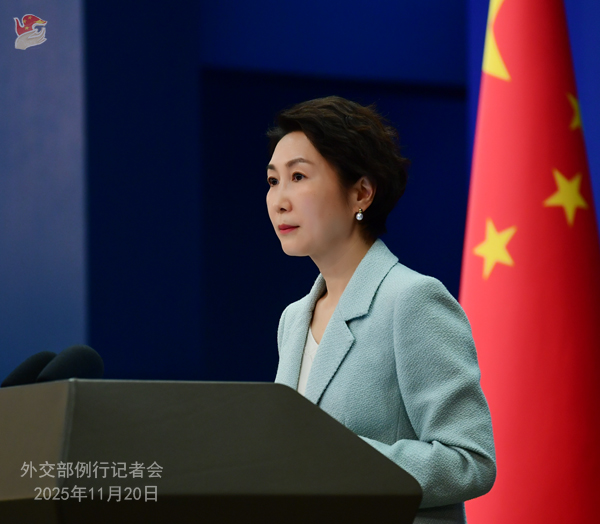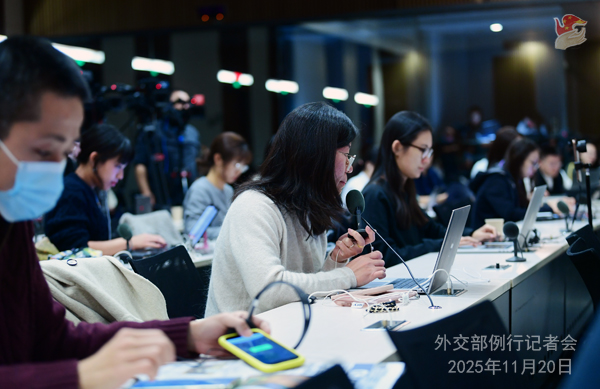
At the invitation of President Xi Jinping, King Tupou VI of the Kingdom of Tonga will pay a state visit to China from November 21 to 27.
Xinhua News Agency: China has just announced that the King of Tonga will pay a state visit to China. Could you share with us the program? How does China view China-Tonga relations and what’s China’s expectation of the visit?
Mao Ning: This is the second state visit of King Tupou VI to China in seven years and is of great significance for the development of bilateral relations. During the visit, the two sides will have an in-depth exchange of views on bilateral relations and international and regional issues of mutual interest.
Tonga is China’s good friend and partner in the Pacific islands region. China attaches great importance to its ties with Tonga, and stands ready to work with Tonga through the upcoming visit to bring the bilateral relations to new heights.
Reuters: According to Indian media, a commission created by the U.S. Congress released a report, which claimed that China led a “disinformation campaign” against the French Rafale jets, involving AI technology. The campaign ran after the India-Pakistan military clash to promote the Chinese J-35s instead. Does the Foreign Ministry have any comment on these reports or on the U.S. government report?
Mao Ning: This so-called “commission” that you mentioned always harbors ideological bias against China and has no credibility to speak of. The commission’s report itself is disinformation.

Global Times: Regarding Japanese Prime Minister Sanae Takaichi’s remarks on hypothetical situations on Taiwan, many Chinese people believe that Japan bears historical responsibility on the Taiwan question and is least of all in a position to talk about situations concerning Taiwan. What is your comment?
Mao Ning: In history, Japan forcibly occupied Taiwan and exerted colonial rule on the island for half a century. Under Japanese occupation, the people in Taiwan suffered enormously. Hundreds of thousands of our compatriots in Taiwan were killed, the people had no political rights, no freedom of religious belief or freedom of culture whatsoever, and Taiwan’s mineral resources and life supplies were massively plundered. The crimes and atrocities that Japanese aggressors committed in Taiwan were innumerable and they form the darkest page in the history of Taiwan.
This year marks the 80th anniversary of China’s recovery of Taiwan. Japan must never forget that Taiwan is China’s Taiwan. Taiwan is none of Japan’s business. If Japan creates trouble on Taiwan, Japan will not get away with it.
AFP: A U.S. citizen who was accused of offering sensitive information to China in 2024 when he worked at a U.S. military base in Germany went on trial on Wednesday. Does the Foreign Ministry have a comment on this?
Mao Ning: I am not familiar with what you mentioned.
CCTV: It’s reported that regarding Prime Minister Sanae Takaichi’s remarks on Taiwan, Japanese senior officials claimed that the comments do not alter the government’s existing position and that Japan does not intend to retract them. Does China accept Japan’s explanation?
Mao Ning: I’m not sure what exactly Japan meant by “the Japanese government’s existing position.” When it comes to the Taiwan question, the position of the Japanese government is supposed to be upholding the one-China principle and abiding by the spirit of the four political documents between China and Japan, instead of being deliberately ambiguous, and still less turning back the wheel of history.
Eighty years ago, Chinese soldiers and civilians, including our compatriots in Taiwan, defeated the Japanese aggressors after heroic and strenuous fighting, achieved the great victory of the Chinese People’s War of Resistance Against Japanese Aggression and realized Taiwan’s return to the motherland. Treaties and instruments such as the Cairo Declaration, the Potsdam Proclamation and the Japanese Instrument of Surrender clearly affirmed China’s sovereignty over Taiwan. China’s recovery of Taiwan is an outcome of the WWII victory and an integral part of the postwar international order.
If there has truly been no change to the Japanese government’s position on the Taiwan question, the Japanese leader should not have linked it to a so-called “survival-threatening situation,” and should not have acted against China’s red line over and over while claiming that there has been no change to Japan’s position. Merely stating that the position “has not changed” does not resolve China’s concerns. Japan needs to take seriously what it has heard from China, retract the erroneous remarks, and take practical steps to honor its commitments to China.

NHK: According to Reuters’ report, the ROK’s Ministry of Culture, Sports and Tourism is notified by the Chinese side that the China-Japan-ROK Culture Ministers’ Meeting that was scheduled for this month will be postponed. What’s your comment?
Mao Ning: The extremely erroneous remarks made by the Japanese leader on Taiwan have hurt the sentiments of the Chinese people and posed a challenge to the postwar international order. They have disrupted the foundation and atmosphere of trilateral cooperation among China, Japan and the ROK. As a result, the conditions are not yet ready for holding the relevant meeting.
NHK: On importing Japanese aquatic products to China, you said at yesterday’s press conference that Japan has so far been unable to provide the technical materials under its commitment. Japan’s Chief Cabinet Secretary said at a press conference this morning that the two sides are going through the technical matters. If Japan has the technical materials ready and provides them to China, will China consider immediately resuming the import of Japanese aquatic products?
Mao Ning: On the import of Japanese aquatic products to China, competent authorities of China will conduct science-based assessments and rigorous reviews in accordance with laws and regulations to ensure that relevant aquatic products meet China’s standards.
As we said yesterday, because of the Japanese leader’s erroneous remarks concerning Taiwan and other major issues of principle, there has been strong indignation from the Chinese people. Under current circumstances, there will be no market for Japanese aquatic products even if they enter China.
China News Service: Earlier this week, the spokesperson said that Premier Li Qiang has no plans to meet with the Japanese leader at the G20. The Japanese side has nevertheless said repeatedly that they are open to dialogue and contact with the Chinese side. Is there a possibility that the leaders of the two countries will meet on the sidelines of the G20?
Mao Ning: Premier Li Qiang has no plans to meet with the Japanese leader. The Japanese side needs to maintain some self-respect.
Reuters: Lai Ching-te has taken to social media today to show his support for Japan by eating sushi for lunch, as his social media account shows. Does the Ministry have any comment on this?
Mao Ning: Whatever show the Lai Ching-te authorities put on, it does not change the fact that Taiwan is China’s Taiwan and it is an inalienable part of China’s territory.
